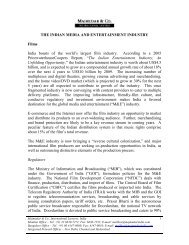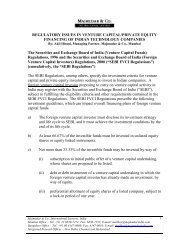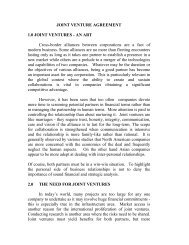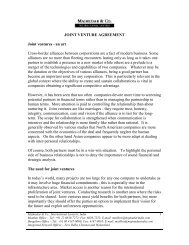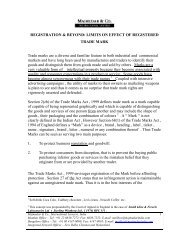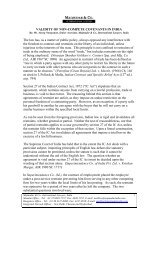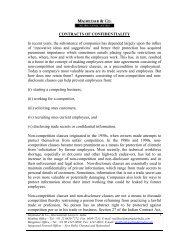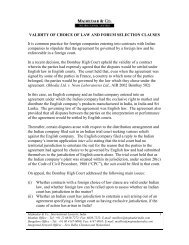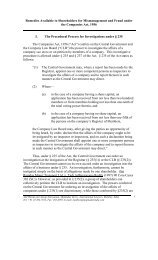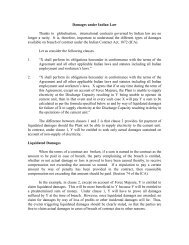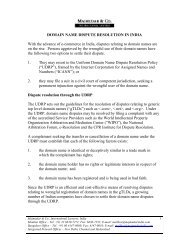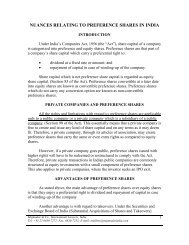LITIGATING IN INDIA The Indian Judicial System ... - Majmudar & Co.
LITIGATING IN INDIA The Indian Judicial System ... - Majmudar & Co.
LITIGATING IN INDIA The Indian Judicial System ... - Majmudar & Co.
Create successful ePaper yourself
Turn your PDF publications into a flip-book with our unique Google optimized e-Paper software.
<strong>LITIGAT<strong>IN</strong>G</strong> <strong>IN</strong> <strong>IN</strong>DIA<br />
<strong>The</strong> <strong>Indian</strong> <strong>Judicial</strong> <strong>System</strong><br />
<strong>The</strong> Supreme <strong>Co</strong>urt of India in New Delhi is at the apex of India’s judicial system.<br />
Its main function is to hear writ applications and appeals from the orders of the<br />
High <strong>Co</strong>urts and other judicial and quasi-judicial bodies. Each state in India has a<br />
High <strong>Co</strong>urt, which is the highest state court. Some High <strong>Co</strong>urts have original as<br />
well as appellate jurisdiction. Suits can only be filed in High <strong>Co</strong>urts that have<br />
original jurisdiction, namely, Bombay, Delhi, Calcutta and Madras.<br />
<strong>The</strong> <strong>Indian</strong> states are divided into districts. In each district, the district courts of<br />
senior division are the courts of first instance for claimants. Appeals from the<br />
senior division courts lie to the High <strong>Co</strong>urt.<br />
Interim Relief<br />
In order to obtain interim relief, an application can be made to a <strong>Co</strong>urt that has<br />
jurisdiction. For example, if the dispute involves leased assets, the plaintiff may<br />
move the court for interim relief, namely, an injunction preventing the defendant<br />
from using or alienating the property, and an order seeking the appointment of the<br />
<strong>Co</strong>urt Receiver as receiver of the leased assets, pending the final disposal of the<br />
suit.<br />
Order XXXIX Rule 1 of the CPC, relating to temporary injunctions provides, in<br />
material part, as follows:<br />
Where in any suit it is proved by affidavit or otherwise,-<br />
(a) that any property in dispute in a suit is in danger of being wasted, damaged or<br />
alienated by any party to the suit, or wrongfully sold in execution of a decree,<br />
or<br />
(b) that the defendant threatens, or intends, to remove or dispose of his property<br />
with a view to defrauding his creditors, [sic]<br />
(c) that the defendant threatens to dispossess the plaintiff or otherwise cause<br />
injury to the plaintiff in relation to any property in dispute in the suit, the<br />
<strong>Majmudar</strong> & <strong>Co</strong>., International Lawyers, India 1<br />
Mumbai Office – Tel: +91 22 6630-7272; Fax: 6630-7252; E-mail: mailbox@majmudarindia.com<br />
Bangalore Office – Tel: +91 80 4147-0000; Fax: 4147-0010; E-mail: mailbox@majmudarindia.com<br />
Integrated Network Offices – New Delhi, Chennai and Hyderabad
<strong>Co</strong>urt may by order grant a temporary injunction to restrain such act, as the<br />
<strong>Co</strong>urt thinks fit, until the disposal of the suit or until further orders.<br />
A notice of motion is usually accompanied by an affidavit setting out all the<br />
relevant facts. It must be served upon the other party. However, in exigent<br />
circumstances, an ex parte application may be made. <strong>The</strong> court is also empowered<br />
to make other interlocutory orders providing for interim sale of perishable<br />
property, detention, preservation, inspection, etc., of the subject-matter of the suit,<br />
and the deposit of money in court.<br />
Under Order XL, the court can appoint a receiver of the property only if it is “just<br />
and convenient” to do so. <strong>The</strong> words “just and convenient” do not mean that the<br />
court is to appoint a receiver simply because the court thinks it convenient – they<br />
mean that the court should appoint a receiver for the protection of rights or for the<br />
prevention of injury according to legal principles. (Holmes v Millage [1893] 1 QB<br />
551, as cited in 3, Mulla, <strong>Co</strong>de of Civil Procedure (14 th ed) at p.2166). A court<br />
can also appoint a receiver of properties that are within the jurisdiction of another<br />
court (Dhakuria Banking <strong>Co</strong>rporation v Surabala Debi [1953] AC 610, id at p<br />
2159).<br />
At present, notices of motion from 1999 are still pending in the Bombay High<br />
<strong>Co</strong>urt. <strong>The</strong>refore, when such a motion is filed, it is imperative to plead for adinterim<br />
relief pending the disposal of the motion along with interim relief pending<br />
the disposal of the motion and interim relief pending the disposal of the suit. Once<br />
the court grants ad-interim relief, the securities are protected. This frequently<br />
facilitates an early settlement. <strong>The</strong> defendant is aware that nothing can be done<br />
with the property while the injunction is in operation, i.e., the property is<br />
inalienable for the next 15 to 20 years. Thus, the defendant may opt to settle the<br />
matter and vindicate the property.<br />
<strong>The</strong> foregoing is possible if enforceable security is available to the plaintiff. But<br />
in most joint ventures, etc, such security is not available. In these circumstances,<br />
it is extremely important to provide for and exhaust all available alternate dispute<br />
resolution remedies before commencing litigation.<br />
<strong>Majmudar</strong> & <strong>Co</strong>., International Lawyers, India 2<br />
Mumbai Office – Tel: +91 22 6630-7272; Fax: 6630-7252; E-mail: mailbox@majmudarindia.com<br />
Bangalore Office – Tel: +91 80 4147-0000; Fax: 4147-0010; E-mail: mailbox@majmudarindia.com<br />
Integrated Network Offices – New Delhi, Chennai and Hyderabad
Summary Procedure<br />
Order XXXVII of the CPC, provides a special procedure for trial of certain classes<br />
of suits such as suits upon bills of exchange and promissory notes and those in<br />
which the plaintiff seeks to recover only a debt or liquidated demand in money<br />
payable by the defendant, with or without interest. <strong>The</strong> claims must arise out of a<br />
written contract, an enactment where the sum sought to be recovered is a fixed<br />
sum of money or a debt other than a penalty, or a guarantee when the claim<br />
against the principal is in respect of a debt or liquidated demand only. Summary<br />
suits can only be carried out by High <strong>Co</strong>urts, City Civil <strong>Co</strong>urts and <strong>Co</strong>urts of<br />
Small Causes. Other courts can carry out summary suits subject to any restriction<br />
that the High <strong>Co</strong>urt may, by notification in the Official Gazette, impose. (Rule 1<br />
of Order XXXVII of the CPC)<br />
<strong>The</strong> essence of the summary suit is that the defendant is not, as in an ordinary suit,<br />
entitled to the right to defend the suit (see 3, Mulla, <strong>Co</strong>de of Civil Procedure (14 th<br />
ed) at p 2105). He must apply for leave to defend within 10 days from the date of<br />
service of the writ of summons upon him. Such leave will be granted only if the<br />
affidavit filed by the defendant discloses facts that indicate that the defendant has<br />
a substantial defence or that the defence is not frivolous or vexatious. If no leave<br />
to defend is granted, the plaintiff is entitled to a decree. <strong>The</strong> object underlying the<br />
summary procedure is to prevent unreasonable obstruction by a defendant without<br />
a defence (ibid).<br />
For foreign corporations doing business in India, Order XXXVII is very effective<br />
for enforcing guarantees. But the Reserve Bank of India does not easily grant<br />
permissions to <strong>Indian</strong> nationals to guarantee payments of money overseas. Where<br />
such guarantees are furnished, the foreign companies will be able to avail of the<br />
summary procedure.<br />
Alternate Dispute Resolution<br />
<strong>The</strong> Arbitration & <strong>Co</strong>nciliation Ordinance, 1996, consolidates arbitration laws in<br />
India. It also provides for conciliation or mediation. Separate provisions have<br />
been made for domestic and foreign awards.<br />
Litigation in India can be endless. <strong>The</strong>refore, foreign corporations seeking to do<br />
business in India should take adequate precautions at the outset. <strong>The</strong> agreements<br />
<strong>Majmudar</strong> & <strong>Co</strong>., International Lawyers, India 3<br />
Mumbai Office – Tel: +91 22 6630-7272; Fax: 6630-7252; E-mail: mailbox@majmudarindia.com<br />
Bangalore Office – Tel: +91 80 4147-0000; Fax: 4147-0010; E-mail: mailbox@majmudarindia.com<br />
Integrated Network Offices – New Delhi, Chennai and Hyderabad
should be negotiated with great care and detailed alternate dispute resolution<br />
clauses should be included. A foreign corporation setting up a joint venture with<br />
an <strong>Indian</strong> partner must include a conciliation and an arbitration clause in the<br />
contract. In the event of a dispute, the first step would be to conciliate and, if<br />
conciliation is unsuccessful, the matter is referred to arbitration.<br />
But, in many cases, arbitration is the first round of the battle. An application can<br />
be made for setting aside arbitral awards on many grounds, namely, lack of<br />
jurisdiction, improper appointment of arbitrators, et seq. Such applications take<br />
between six (6) and twelve (12) months to be heard. Further, appellate remedies<br />
are also available. <strong>The</strong>refore, recovery can be delayed to a certain extent.<br />
<strong>Majmudar</strong> & <strong>Co</strong>., International Lawyers, India 4<br />
Mumbai Office – Tel: +91 22 6630-7272; Fax: 6630-7252; E-mail: mailbox@majmudarindia.com<br />
Bangalore Office – Tel: +91 80 4147-0000; Fax: 4147-0010; E-mail: mailbox@majmudarindia.com<br />
Integrated Network Offices – New Delhi, Chennai and Hyderabad



